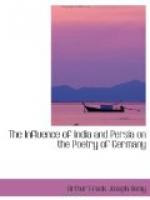This exclusive interest in the purely didactic side induced Herder also to remove the maxims from the stories which in the Gulistan or Hitopadesa served as their setting. So they appear simply as general sententious literature, whereas in the originals they are as a rule introduced solely to illustrate or to emphasize some particular point of the story. Then again a story may be considerably shortened, as in “Die Luege” (Bl. ii. 28 = Gul. i. 1), “Der heilige Wahnsinn” (see above). To atone for such abridgment new lines embodying in most cases a general moral reflection are frequently added. Thus both the pieces just cited have such additions. In “Verschiedener Umgang” (Ged. 3 = Bhart. Nitis. 67; Boehtl. 6781) the first three lines are evidently inspired by the last line of the Sanskrit proverb: prayena ’dhamamadhyamottamagunah samsargato jayate “in general the lowest, the middle and the highest quality arise from association,” but they are in no sense a translation.
What we have given suffices to characterize Herder as a translator or adapter of Oriental poetry. His Eastern studies have scarcely exerted any influence on his original poems beyond inspiring some fervid lines in praise of India and its dramatic art as exhibited in Sakuntala,[84] which had just then (1791) been translated by Forster into German from the English version of Sir William Jones. Unlike his illustrious contemporary Goethe he received from the East no impulse that stimulated him to production. His one-sided preference for the purely didactic element rendered him indifferent to the lyric beauty of Hafid and caused him to proclaim Sa’di as the model most worthy of imitation.[85] Yet it was Hafid, the prince of Persian lyric poets, the singer of wine and roses, who fired the soul of Germany’s greatest poet and inspired him to write the Divan, and thus Hafid became the dominating influence and the guiding star of the west-oestliche Richtung in German poetry.
FOOTNOTES:
[79] See the edition by Meyer (KDNL. vol. 74) i. 1. pp. 164, 165.
[80] Given by Redlich in the edition by Suphan, vol. 26, p. 435 seq.
[81] We may state here that the work in question has been thoroughly commented on by such scholars as Duentzer and Redlich, and their comments may be found in the editions of Suphan and Meyer. The same has been done for Goethe’s Divan by Duentzer and Loeper. The former’s notes are in his Goethe-edition in the Kuerschner-series, the latter’s in the edition of Hempel. In this investigation, therefore, the chapters on Herder and Goethe are somewhat briefer than they otherwise would be, as further details as to sources, etc., are easily accessible in the editions just mentioned. In all cases, however, the Sanskrit or Persian originals of the passages cited have been examined.
[82] Poeseos Asiaticae commentariorum libri vi, publ. at London, 1774. Reprinted by Eichborn at Leipzig, 1777.




